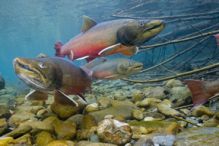Climate Savvy Aquatic Restoration Workshop

March 13-15, 2012 • Portland, OR • U.S. Fish and Wildlife Service
Overview
This workshop is designed to train habitat restoration biologists on how fish and wildlife restoration projects can be planned and implemented to avoid climate change issues and/or increase the resilience of fish and wildlife resources to the impacts of climate change. The target audience is U.S. Fish and Wildlife Service habitat restoration biologists and partners, including the Partners for Fish and Wildlife Program, the Coastal Program, Fisheries, Natural Resource Damage Assessment, Refuges, migratory bird management, recovery biologist, and others. The workshop will focus on one habitat type most restoration biologists share, riparian and aquatic systems. This will allow an in-depth, application based approach to the learning and training workshop.
Agenda & Speakers
Presentations:
- Adapting Salmon Habitat Restoration for Climate Change (Beechie)
- Assessing Salmon Vulnerability to Climate Change (Beechie)
- Climate Change in the Pacific Northwest (Case)
- Climate Change and Freshwaters (Dunham)
- Adapting Your Work to Climate Change (Hansen)
- Invasive Species and Climate Change (Heimowitz)
- Conservation in a Changing Climate (Patte)
- Climate Savvy Restoration Resources Overview (Patte)
- Regional Aquatic Prioritization and Mapping Tool (Shively and Mertens)
Reading & Resources
Worksheets & Handouts:
- Climate Savvy Worksheet (Hansen)
- Assessing Vulnerability Cheat Sheet (Hansen)
- PNW Climate and Hydrologic Resources and Tools (Patte)
- US Historical Climatology Network and PRISM (Patte)
- USHCN_data1925-2010 (Patte)
- PNW Vulnerability Assessment (Case)
- System Analysis Worksheet (Case)
- Species Sensitivity Worksheet (Case)
- Invasive Species Risk Analysis and Prevention Checklist (Heimowitz)
- Regional Aquatic Prioritization Mapping Tool (Shively)
- Hawaii and Pacific Islands Climate Change Information Resources (Mielbrecht)
Web Resources
Workshop Reading Resources
- Bisson, P. A., J. B. Dunham, and G. H. Reeves. 2009. Freshwater ecosystems and resilience of Pacific salmon: habitat management based on natural variability. Ecology and Society 14(1): 45.
- Glick, P., J. Hoffman, M. Koslow, A. Kane, and D. Inkley. 2011. Restoring the Great Lakes’ Coastal Future: Technical Guidance for the Design and Implementation of Climate-Smart Coastal Restoration Projects in the Great Lakes Region.National Wildlife Federation, Ann Arbor, MI.
- Glick, P., B.A. Stein, N.A. Edelson, editors. 2011. Scanning the Conservation Horizon: A Guide to Climate Change Vulnerability Assessment. National Wildlife Federation, Washington, D.C.
- Hansen, L.J., J.R. Hoffman, C. Drews and E.E. Mielbrecht. 2010.Designing Climate-Smart Conservation: Guidance and Case Studies. Conservation Biology. 24:63-68.
- Hansen, L.J. and J.R. Hoffman. 2011. The Hordes at the Gates: Beating Back Invasive Species, Pests, and Diseases (Chapter 12). pp. 159-168. In Climate Savvy: Adapting Conservation and Resource Management to a Changing World. Island Press, Washington, DC.
- Hellmann et. al, 2008. Five Potential Consequences of Climate Change for Invasive Species. Conservation Biology 22:3
General Adaptation Resources
- Climate Adaptation Knowledge Exchange (CAKE) Your online adaptation destination. EcoAdapt, in partnership with Island Press, developed CAKE, an online, georeferenced adaptation resource. CAKE was strategically designed to facilitate a much needed network approach to support natural resource managers, conservation practitioners, and community planners at all levels of adaptation awareness. CAKE includes a case studies database of on-the-ground adaptation efforts, a virtual library of useful resources to support adaptation action, a community forum with an expert advice column, a directory of individuals and organizations rich with adaptation knowledge, and a tools section full of useful online resources for adaptation action. CAKE facilitates the sharing of knowledge and strategies in order to create a community of practice.
- The State of Marine and Coastal Adaptation in North America: A Synthesis of Emerging Ideas Climate change is now widely acknowledged as a global problem that threatens the success of marine and coastal conservation, management, and policy. Mitigation and adaptation are the two approaches commonly used to address actual and projected climate change impacts. Mitigation applies to efforts to decrease the rate and extent of climate change through the reduction of greenhouse gas emissions or the enhancement of carbon uptake and storage; adaptation deals with minimizing the negative effects or exploiting potential opportunities of climate change. Because the benefits of mitigation are not immediate and because we are already committed to a certain amount of climate change, adaptation has been increasingly viewed as an essential component of an effective climate change response strategy. The field of adaptation is developing rapidly but in an ad hoc fashion, and organizations and governments are often challenged to make sense of the dispersed information that is available. The intent of this report is to provide a brief overview of key climate change impacts on the natural and built environments in marine and coastal North America and a review of adaptation options available to and in use by marine and coastal managers. This report presents the results of EcoAdapt’s efforts to survey, inventory, and assess adaptation projects from different regions, jurisdictions, and scales throughout North America’s marine and coastal environments.
- EcoAdapt’s Adaptation Library EcoAdapt maintains a library of our latest projects and documents that might help your work.




